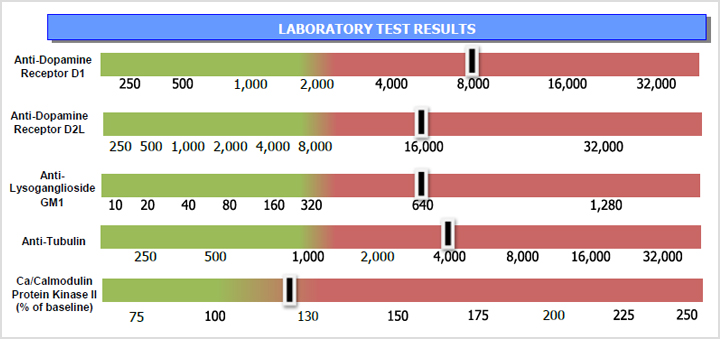Case Reports in Psychiatry: An atypical presentation of Pediatric Acute Neuropsychiatric Syndrome responding to plasmapheresis treatment
Cunningham Panel™ helps identify an autoimmune disorder in child initially diagnosed with schizophrenia

Researchers from the University of Cincinnati College of Medicine describe a complex case involving a 15-year-old girl, who abruptly developed multiple neurologic and psychiatric symptoms including “seizure-like” episodes, psychotic thinking, auditory hallucinations, catatonic movements, obsessive compulsive behaviors, anxiety, and depression.
Over the course of one year, the patient was hospitalized four times and treated unsuccessfully with multiple psychotropic medications. This article published in the June 2018 issue of Case Reports in Psychiatry, points out that although the patient’s anti-NMDAR antibody test was negative and MRI’s were normal, the Cunningham Panel™ of Tests was positive with all 4 of the ELISA assays elevated and the CaM Kinase II borderline. These results supported the diagnosis of an autoimmune-based neuropsychiatric disorder.
Cunningham Panel™ results
Results of patient A’s anti-neuronal antibody panel. Click image below to enlarge.
Highlights:
- Over a one-year period, a 15-year-old female developed an abrupt onset of “seizure-like” spells and other heterogeneous symptoms; psychosis, auditory hallucinations, catatonic movements, obsessive and compulsive behaviors and later developed dysphonia, mouth twitches, eye rolling, stumbling, suicidal thoughts, and insomnia, in addition to other symptoms. She required 4 inpatient psychiatric hospitalizations.
- Patient was initially diagnosed with schizophrenia. Although the patient did report a recent streptococcal infection, lab tests showed that she had normal ASO titers. The patient also had normal MRI’s and a negative result on an Anti-N-Methyl-D-Aspartate (NMDA) receptor antibody test.
- An immunologist was consulted and the Cunningham Panel™ of Tests was ordered. The Cunningham Panel™ of Tests was positive with all 4 ELISA assays elevated and a borderline CaM KII.
- Patient’s diagnosis was changed to PANS and she began one course of plasmapheresis.
- Patient’s symptoms resolved completely. Within 2 weeks of plasmapheresis, she had resumed all of her normal activities, including tennis. Her response was sustained for more than 6 months.
What is the Cunningham Panel™ of tests?
The Cunningham Panel™ is a blood test which measures the levels of circulating autoantibodies associated with certain neurologic and psychiatric symptoms. Elevated levels indicate that symptoms may be due to an infection-driven autoimmune problem, rather than a neuropsychiatric disorder.
Drew H. Barzman, Hannah Jackson, Umesh Singh, Marcus Griffey, Michael Sorter, and Jonathan A. Bernstein, “An Atypical Presentation of Pediatric Acute Neuropsychiatric Syndrome Responding to Plasmapheresis Treatment,” Case Reports in Psychiatry, June 28, 2018, Vol. 2018, doi.org/10.1155/2018/8189067
Digital Information Packet
Interested in learning more about infection-induced autoimmune encephalopathies, such as PANS/PANDAS? We have compiled a list of materials including journal articles and videos that may be helpful to you. Enter your email address below to get access to these articles.






